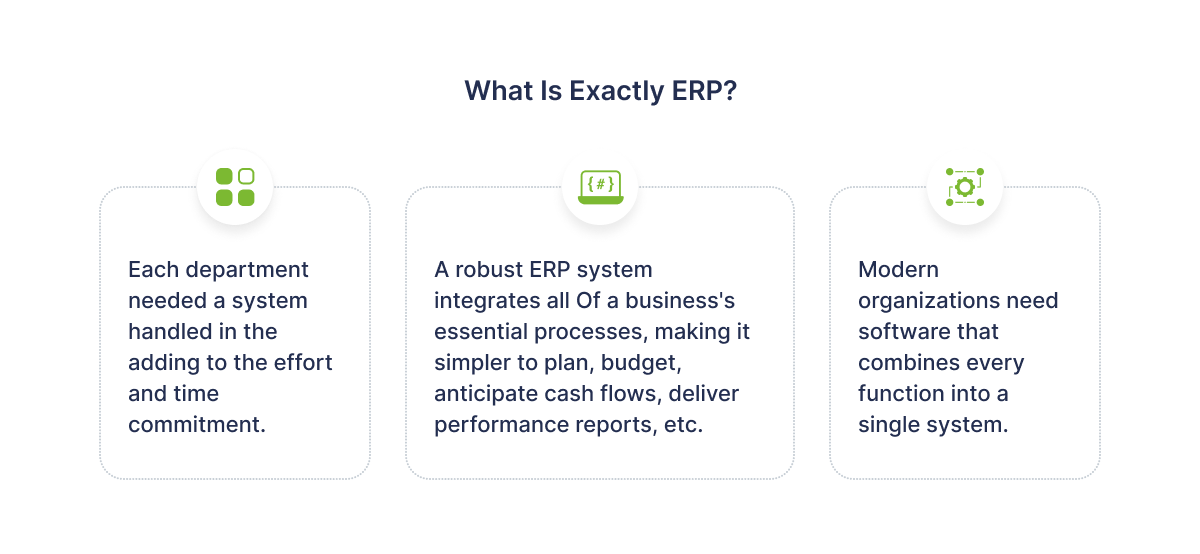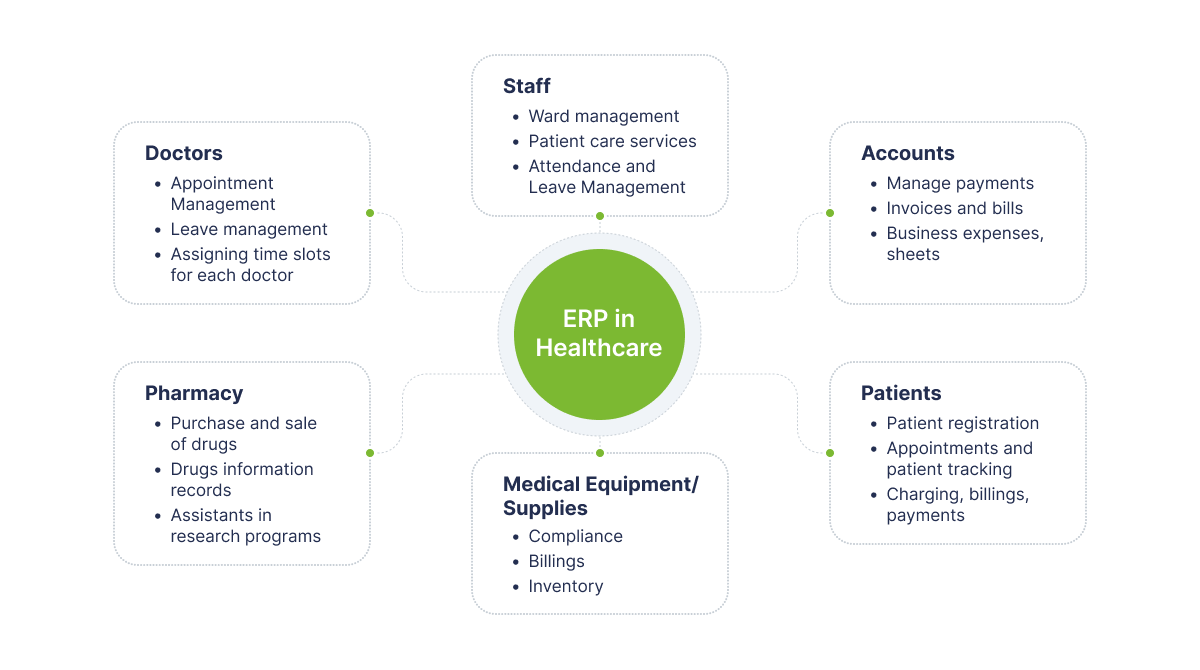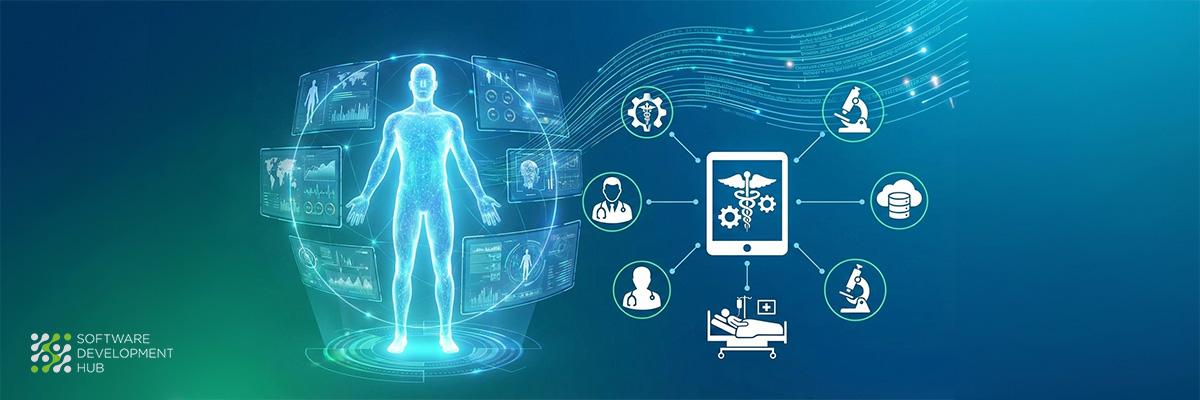Enterprise Resource Planning (ERP): Core Features for Healthcare
Understanding the dynamic landscape and unique challenges healthcare providers face is critical. Enterprise resource planning (ERP) systems specifically designed for healthcare play a key role in streamlining operations, increasing efficiency, and improving overall patient care. As practice shows, the use of ERP systems reduces costs by 23%, and 95% of companies that have implemented solutions confirm positive changes. It improves processing speed, operational compatibility and eliminates clinical errors.
In this article, we'll dive into the core features of healthcare ERP systems and explore the challenges facing the healthcare industry today.
What is ERP for Healthcare?

Enterprise Resource Planning (ERP) is a comprehensive software solution designed to integrate and manage core business processes across various departments within an organization. In the context of healthcare, ERP serves as a centralized platform that consolidates data and facilitates communication between different healthcare units, ensuring a seamless flow of information.
Key Features of Healthcare ERP Systems

Automation
Automation is a cornerstone feature of Healthcare ERP systems. It streamlines routine administrative tasks, such as appointment scheduling, billing, and claims processing. Automation reduces the risk of errors and frees up valuable time for healthcare professionals to focus on patient care.
Integrations
It enables the seamless exchange of information between disparate systems, ensuring that patient data, billing information, and other critical details are consistently and accurately updated across the entire organization. Third-party integrations with laboratories, databases, chatbots, and AI-driven tools open up many business opportunities.
Tracking and Visibility
Healthcare ERP systems provide real-time tracking and visibility into various aspects of patient care, from appointment scheduling to treatment plans. This feature enhances coordination among healthcare providers, leading to improved patient outcomes and a more efficient healthcare delivery process.
Patient Portals, CRM
Patient engagement is a key focus in modern healthcare. ERP systems for healthcare often include patient portals and Customer Relationship Management (CRM) tools. These features empower patients by allowing them to access their medical records, schedule appointments, and communicate with healthcare providers securely.
Supply Chain Management (SCM)
Efficient supply chain management is crucial for healthcare institutions to ensure the availability of essential medical supplies. Healthcare ERP systems integrate SCM functionalities, optimizing inventory control, order processing, and supplier management, thereby preventing disruptions in the supply chain.
Read also: Key Steps to Improve Cybersecurity in Healthcare
Financial Management
Financial management is a critical component of healthcare operations. Healthcare ERP solutions offer modules for billing, invoicing, and financial reporting, streamlining the financial processes of healthcare providers and improving overall fiscal responsibility.
Sales and Marketing
In the competitive landscape of healthcare, effective sales and marketing strategies are essential. ERP systems for healthcare often include tools for managing sales leads, marketing campaigns, and analyzing market trends, empowering healthcare organizations to stay competitive and attract patients.
Human Resources
Managing a diverse workforce is a challenge for healthcare organizations. Healthcare ERP systems incorporate Human Resources (HR) modules that assist in personnel management, including employee onboarding, payroll processing, and performance evaluation.
Reporting and Analytics
Robust reporting and analytics are integral to data-driven decision-making in healthcare. ERP systems provide advanced reporting tools, enabling healthcare professionals to analyze data trends, assess performance metrics, and make informed decisions to enhance overall efficiency.
Clinical Decision Support
Clinical Decision Support (CDS) is a feature that assists healthcare professionals in making informed and evidence-based decisions. Healthcare ERP systems integrate CDS tools, offering real-time access to medical information, treatment guidelines, and patient data to support clinical decision-making.
Read also: How AI in Healthcare Is Transforming Industry
Custom ERP for Healthcare: Cost Estimate
Here's a simplified table view for the estimated time and cost for developing a custom ERP with the specified features:
|
Role |
Total Hours |
Total Cost ($) |
|
Business Analyst |
2080 |
62400 |
|
Project Manager |
2080 |
58240 |
|
Backend Developer (x2) |
4160 |
145600 |
|
Frontend Developer (x2) |
4160 |
145600 |
|
UI/UX Designer |
2080 |
52000 |
|
QA Tester |
2080 |
52000 |
|
DevOps Engineer |
2080 |
79040 |
|
Total Cost (Development) |
- |
594880 |
Please note that these are still rough estimates, and the actual costs may vary based on the project specifics, team efficiency, and unforeseen challenges. It's recommended to consult with development firms for a more accurate and tailored estimate based on your project's detailed requirements.
What Are the Challenges Healthcare Industry Faces Today?
Despite the numerous advantages of Healthcare ERP systems, the healthcare industry faces several challenges. These include data security concerns, the need for seamless interoperability between different systems, and the ongoing challenge of adapting to evolving regulatory requirements.
Additionally, healthcare organizations must navigate the transition to cloud-based ERP solutions and customize their ERP systems to meet specific industry needs.
In conclusion, healthcare ERP systems are essential tools for healthcare organizations looking to increase efficiency, improve patient care, and navigate industry complexities. By incorporating key features such as automation, integration, and advanced analytics, healthcare providers can succeed in an ever-changing environment. However, addressing data security, interoperability, and regulatory compliance issues remains critical to the successful implementation and long-term sustainability of ERP solutions in the healthcare sector. The integration of the ERP system will be carried out by Software Development Hub, taking on all the minor tasks. The results in the form of improved efficiency and speed will not be long in coming.
Categories
Share
Need a project estimate?
Drop us a line, and we provide you with a qualified consultation.








